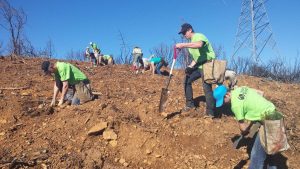Guess which of these bits of gardening advice are true: putting sugar in the planting hole for tomatoes will make them sweeter; when planting a new tree, always stake it; beer makes a great lawn and garden fertilizer. The answer: not, not and not. Sometimes gardening folklore is silly—but harmless. Sometimes, the misconceptions can do more harm than good. With that in mind, here are three more gardening myths that also need to go bye-bye.
Our clay soil is bad for gardening. Yes, it’s harder to dig (especially with all of the rock), and yes, too much clay in a soil can cause drainage and aeration problems for some plants. But the good news is clay happens to be a nutrient magnet for plants because its surface structure and chemical properties naturally attract many of the essential elements of plant nutrition, such as calcium, magnesium, potassium, hydrogen and iron, among others. “Because clay minerals are so active in nutrient exchanges,” explains the California Master Gardener Handbook, “they are major determinants of the chemical and physical properties of a given soil, and they largely determine how well plants will grow in that soil.” If you need to improve drainage in dense clay soil, work in organic compost.
Amend the Soil. The best way to plant is to fill the newly dug hole with soil amendments. Studies show that nothing is gained by amending backfill with store-bought garden soil, fertilizer or other substances. And some “amendment” practices can actually be harmful, like chucking a handful of fertilizer in the planting hole too close to the plant’s roots, which can chemically burn them. Current research tells us that the best planting practice is to use the soil you just shoveled out as backfill and to use organic matter as mulch on top of the soil after planting to improve soil structure, conserve water and discourage weeds. This planting method will be especially successful if you dedicate much of your garden to native and/or Mediterranean plants,
Use vitamin B1 when you plant to stimulate root growth. “Applying vitamin B-1, or thiamine, to root systems of whole plants does not stimulate root growth,” says Linda Chalker-Scott, Ph.D., Extension Horticulturist and Associate Professor, Puyallup Research and Extension Center, Washington State University. “This is a myth that refuses to die, though it has been repeatedly refuted in the scientific literature.” She stresses that healthy soil and adequate moisture are critical for successful planting and transplanting, but that plants inherently difficult to transplant “. . . may be aided by application of auxin-containing products in addition to nitrogen …” (Auxins are plant hormones available in many of the commercially available rooting compounds.)
As for tree staking, beer and sugar? Swaying in the wind helps young tree trunks grow stronger, a small bowl of beer does make a great snail trap, and the sugar is better off in a tall glass of iced tea.
Rachel Oppedahl is a University of California Cooperative Extension Master Gardener of Tuolumne County.
UCCE Master Gardeners of Tuolumne County can answer home gardening questions. Call 209-533-5912 or go to: http://ucanr.edu/survey/survey.cfm?surveynumber=7269 to fill out our easy-to-use problem questionnaire. Check out our website at: http://cecentralsierra.ucanr.edu/Master_Gardeners/ You can also find us on Facebook, or pick up the local Master Gardener book “Sharing the Knowledge: Gardening in the Mother Lode” at Mountain Books or the UCCE Office both in Sonora, CA.


